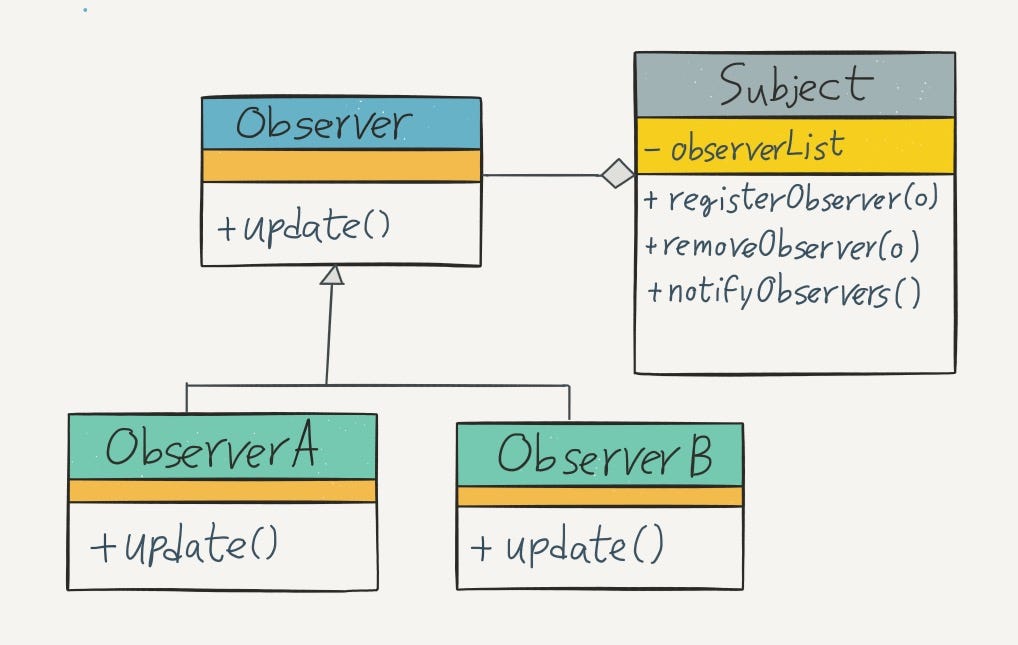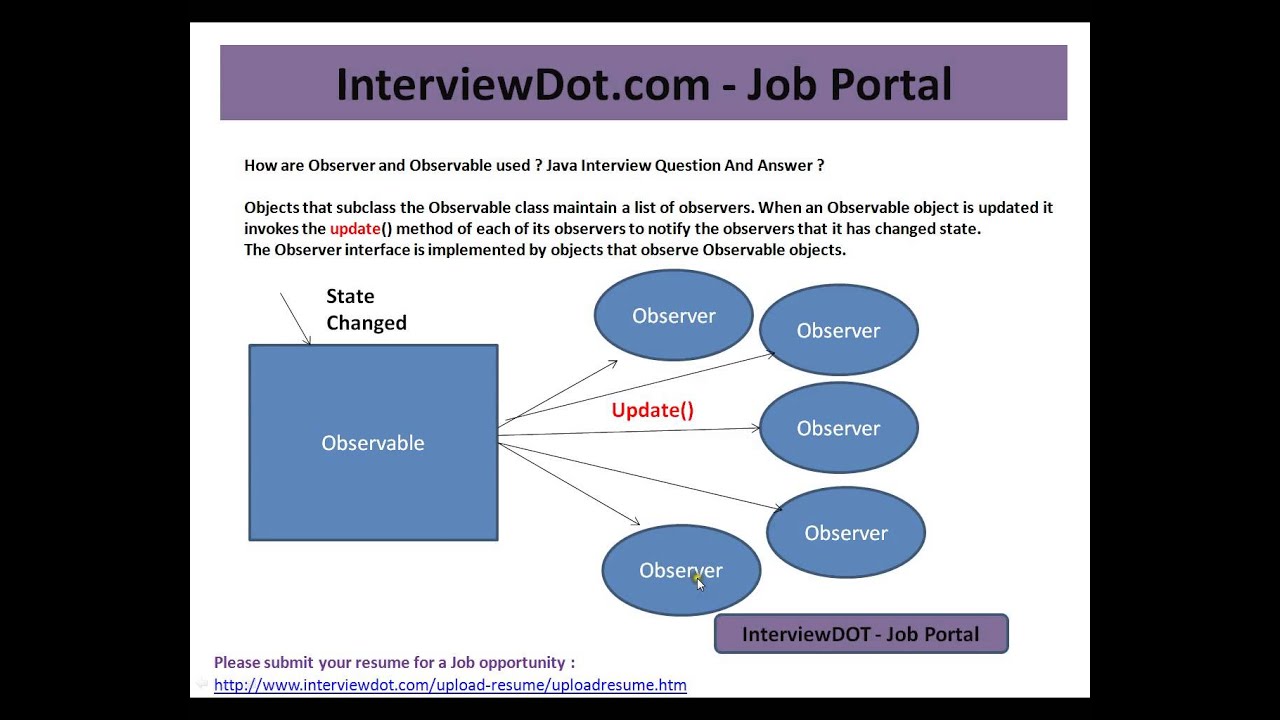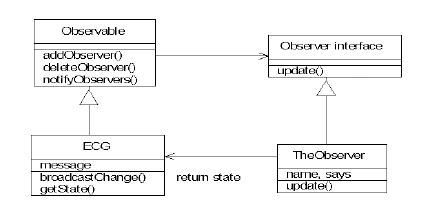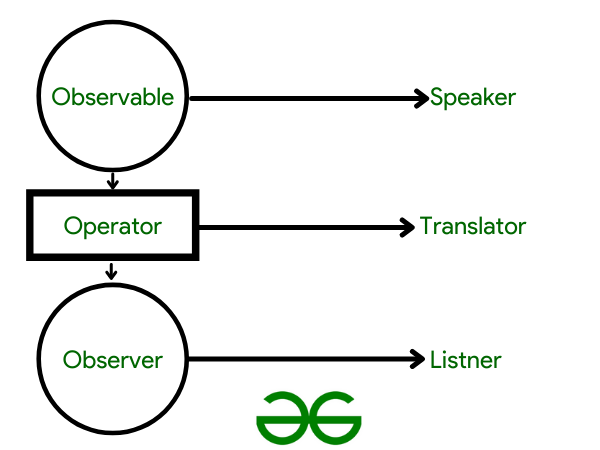What is an Observer in Java?
What is an Observer in Java?

I'm happy to help!
An observer in Java is a design pattern that defines a one-to-many dependency between objects, where the dependence is such that when one object changes its state, all of its dependents are notified and updated automatically.
The Observer pattern is often used when you have objects (observers) that need to be informed about changes made to another object (subject). This way, the subjects don't need to know about each individual observer; instead, they simply notify a list of observers about changes. The observers then react accordingly.
Here's how it works:
Subject (the observed): This is the object that needs to be monitored and changed. It maintains a reference to all its observers. Observer: These are the objects that need to be informed about changes made to the subject. They register themselves with the subject when they want to be notified.When an observer wants to know when the subject changes, it:
Registers itself with the subject by calling the subject'sregisterObserver(Observer obs) method. Notifies the subject by calling its update(Observer obs) method when it needs to update or be updated.
The subject keeps track of all registered observers and notifies them whenever a change occurs. When an observer is notified, it can react accordingly (e.g., redraw itself).
Benefits of using the Observer pattern include:
Decoupling: The subject doesn't need to know about each individual observer. Flexibility: Observers can be added or removed at runtime without affecting the subject. Reusability: You can reuse observers across multiple subjects.In Java, you can implement the Observer pattern using interfaces and classes. Here's an example implementation:
// Subject (Observable)public interface Observable {
void registerObserver(Observer observer);
void notifyObservers();
}
public class WeatherStation implements Observable {
private List observers;
private double temperature;
public WeatherStation() {
this.observers = new ArrayList<>();
}
@Override
public void registerObserver(Observer observer) {
observers.add(observer);
}
@Override
public void notifyObservers() {
for (Observer observer : observers) {
observer.update(temperature);
}
}
public void setTemperature(double temperature) {
this.temperature = temperature;
notifyObservers();
}
}
// Observer
public interface Observer {
void update(double temperature);
}
public class WeatherReporter implements Observer {
@Override
public void update(double temperature) {
System.out.println("Weather: " + temperature);
}
}
// Usage:
public static void main(String[] args) {
WeatherStation weather = new WeatherStation();
WeatherReporter reporter1 = new WeatherReporter();
WeatherReporter reporter2 = new WeatherReporter();
weather.registerObserver(reporter1);
weather.registerObserver(reporter2);
weather.setTemperature(20.0); // observers are notified
weather.setTemperature(25.0); // observers are notified again
}
In this example, the WeatherStation is the subject, and the WeatherReporter is an observer that updates itself when the temperature changes.
This pattern is widely used in Java applications, such as GUI systems where components need to react to changes made by other components.
What is an Observable in Java?

I'd be happy to help!
An observable in Java refers to a programming concept that allows you to send notifications of changes to any number of observers (also known as listeners or subscribers). This is typically used for event-driven systems, where the observer registers interest for certain events and gets notified when they occur. Observables are often used in conjunction with reactive programming patterns.
In Java, observables can be implemented using various libraries and frameworks, such as RxJava, Project Reactor, or the original Observable class provided by Google's Guava library. These libraries provide a set of APIs for creating and manipulating observables.
Here is a high-level overview of how observables work:
Create an observable: You create an observable object that holds some data or state. Subscribe to notifications: One or more observers (or listeners) register interest in the observable, indicating they want to be notified when certain events occur. Notify observers: When something significant happens to the observable's state (e.g., a value changes), you notify all registered observers about this change. Observers react: Each observer reacts to the notification by updating their internal state or performing some other action.Observables can be used in various scenarios, such as:
Event-driven systems: In GUI-based applications, observables are often used to manage user input, such as button clicks or form submissions.
Some key benefits of using observables include:
Decoupling: Observers don't need to know about each other's implementation details, making it easier to modify or replace them without affecting the rest of the system. Scalability: As your application grows and new observers are added, you can handle this change without modifying existing code.
In summary, observables in Java are a powerful programming construct that enables event-driven systems by allowing multiple observers to register interest in an object's state changes. They promote decoupling, scalability, and reusability, making them a popular choice for reactive programming and other scenarios where data changes need to be propagated to interested parties.
How was the explanation?





























